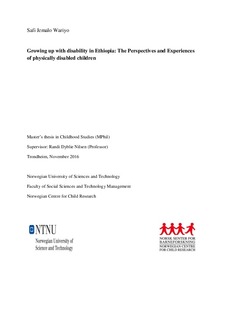| dc.description.abstract | Although disabled children have long been subject of research and policy attention, their situation in the Global South including Ethiopia largely remained unimproved. Societal attitudes about disabled children have been negative. The majority of these children face enormous socioeconomic barriers, lack access to basic needs such as health and education, and subject to multiple deprivation within their family (ACPF, 2011a). Policies and intervention programs also have been less appropriate. Most studies about disabled children have been focusing on documenting the number, the causes and consequences of disability, and the societal attitudes about disability, saying little about the children’s lived experiences. Researchers have been hearing from parents and professionals, leaving the children’s perspectives and experiences largely unexplored. My study aimed to explore the perspectives and experiences of children with physical disabilities based on a two month fieldwork in one of the rehabilitation centers in Ethiopia. Data were collected through participant observation, semi-structured interviews and neighborhood walk with ten children of ages 12 to15 in the rehabilitation centre; focus group discussions with four social workers and interviews with four parents.
The results show that the children in my study tended to hold a relational view about their disability situation in which they live. They viewed their disability situation as a ‘difference’ form able-bodied children basically in terms of physicality/body, in terms of mobility and everyday activity performance. The children also made a point that growing up with disability has rendered them powerlessness, marginalization and lower social status among their able-bodied peers, in family and community. They reported negative societal attitudes and environmental challenges/poor infrastructure as the major barriers to their everyday lives. There was a widespread negative societal attitudes about disability, which the children themselves also tend reproduce, although their perspectives of the disability situation in which they live were changing and varied based on various factors. Disability was viewed by most people as God’s punishment or as caused by elders’ curse or evil spirits. The children were considered as having cursed or sinful family background or as caught by evil spirits and were subject to segregation and marginalization and experienced limited social interaction with able-bodied children as a result. Negative attitudes about the children’s ability were also held in community.
However, various accounts of these children in my study were evidences that not only were these children objects of challenges; they were also active agents who created various adaptive strategies and remain resilient amidst challenges. They play important role in their household through engaging in various activities ranging from home chores to herding cattle and working on farm fields, which demonstrates their agency, despite their disability.
The various rehabilitation services provided in the center have brought a significant improvements in the children’s physical and social wellbeing. However, the negative societal attitudes and poor infrastructures remain unresolved and challenging. Working on the attitudes of community and building enabling environment through facilitating infrastructures would be important measures to improve the wellbeing of the children in addition to providing rehabilitation services in institutions. | nb_NO |
